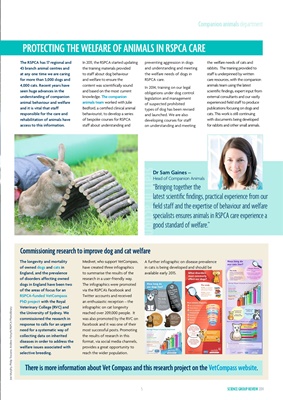
5 SCIENCE GROUP REVIEW 2014
Companion animals department
PROTECTING THE WELFARE OF ANIMALS IN RSPCA CARE
Commissioning research to improve dog and cat welfare
The longevity and mortality
of owned dogs and cats in
England, and the prevalence
of disorders affecting owned
dogs in England have been two
of the areas of focus for an
RSPCA-funded VetCompass
PhD project with the Royal
Veterinary College (RVC) and
the University of Sydney. We
commissioned the research in
response to calls for an urgent
need for a systematic way of
collecting data on inherited
diseases in order to address the
welfare issues associated with
selective breeding.
Medivet, who support VetCompass,
have created three infographics
to summarise the results of the
research in a user-friendly way.
The infographics were promoted
via the RSPCA's Facebook and
Twitter accounts and received
an enthusiastic reception - the
infographic on cat longevity
reached over 209,000 people. It
was also promoted by the RVC on
Facebook and it was one of their
most successful posts. Promoting
the results of research in this
format, via social media channels,
provides a great opportunity to
reach the wider population.
There is more information about Vet Compass and this research project on the VetCompass website.
A further infographic on disease prevalence
in cats is being developed and should be
available early 2015.
staff in action
Dr Sam Gaines -
Head of Companion Animals
"Bringing together the
latest scientific findings, practical experience from our
field staff and the expertise of behaviour and welfare
specialists ensures animals in RSPCA care experience a
good standard of welfare."
The RSPCA has 17 regional and
43 branch animal centres and
at any one time we are caring
for more than 3,000 dogs and
4,000 cats. Recent years have
seen huge advances in the
understanding of companion
animal behaviour and welfare
and it is vital that staff
responsible for the care and
rehabilitation of animals have
access to this information.
In 2011, the RSPCA started updating
the training materials provided
to staff about dog behaviour
and welfare to ensure the
content was scientifically sound
and based on the most current
knowledge. The companion
animals team worked with Julie
Bedford, a certified clinical animal
behaviourist, to develop a series
of bespoke courses for RSPCA
staff about understanding and
preventing aggression in dogs
and understanding and meeting
the welfare needs of dogs in
RSPCA care.
In 2014, training on our legal
obligations under dog control
legislation and management
of suspected prohibited
types of dog has been revised
and launched. We are also
developing courses for staff
on understanding and meeting
the welfare needs of cats and
rabbits. The training provided to
staff is underpinned by written
care resources, with the companion
animals team using the latest
scientific findings, expert input from
external consultants and our vastly
experienced field staff to produce
publications focusing on dogs and
cats. This work is still continuing
with documents being developed
for rabbits and other small animals.
Joe Murphy, Philip Toscano, Andrew Forsyth/RSPCA Photolibrary